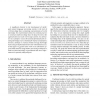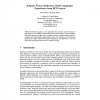12 search results - page 2 / 3 » A Hybrid Approach to Representation in the Janus Natural Lan... |
ITS
2004
Springer
13 years 9 months ago
2004
Springer
When implementing a tutoring system that attempts a deep understanding of students’ natural language explanations, there are three basic approaches to choose between; symbolic, i...
ACSC
2000
IEEE
13 years 9 months ago
2000
IEEE
A significant obstacle to the development of intelligent natural language processing systems is the lack of rich knowledge bases containing representations of world knowledge. Fo...
GI
2003
Springer
13 years 9 months ago
2003
Springer
: Natural Language is not appropriate for reference models because it risks being an in-complete, unstructured and inconsistent form of representation. This paper presents insights...
CP
2004
Springer
13 years 10 months ago
2004
Springer
In CP literature combinatorial design problems such as sport scheduling, Steiner systems, error-correcting codes and more, are typically solved using Finite Domain (FD) models desp...
CHI
2006
ACM
14 years 4 months ago
2006
ACM
Social network-based systems usually suffer from two major limitations: they tend to rely on a single data source (e.g. email traffic), and the form of network patterns is often p...


